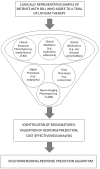Can an Integrated Science Approach to Precision Medicine Research Improve Lithium Treatment in Bipolar Disorders?
- PMID: 30186186
- PMCID: PMC6110814
- DOI: 10.3389/fpsyt.2018.00360
Can an Integrated Science Approach to Precision Medicine Research Improve Lithium Treatment in Bipolar Disorders?
Abstract
Clinical practice guidelines identify lithium as a first line treatment for mood stabilization and reduction of suicidality in bipolar disorders (BD); however, most individuals show sub-optimal response. Identifying biomarkers for lithium response could enable personalization of treatment and refine criteria for stratification of BD cases into treatment-relevant subgroups. Existing systematic reviews identify potential biomarkers of lithium response, but none directly address the conceptual issues that need to be addressed to enhance translation of research into precision prescribing of lithium. For example, although clinical syndrome subtyping of BD has not led to customized individual treatments, we emphasize the importance of assessing clinical response phenotypes in biomarker research. Also, we highlight the need to give greater consideration to the quality of prospective longitudinal monitoring of illness activity and the differentiation of non-response from partial or non-adherence with medication. It is unlikely that there is a single biomarker for lithium response or tolerability, so this review argues that more research should be directed toward the exploration of biosignatures. Importantly, we emphasize that an integrative science approach may improve the likelihood of discovering the optimal combination of clinical factors and multimodal biomarkers (e.g., blood omics, neuroimaging, and actigraphy derived-markers). This strategy could uncover a valid lithium response phenotype and facilitate development of a composite prediction algorithm. Lastly, this narrative review discusses how these strategies could improve eligibility criteria for lithium treatment in BD, and highlights barriers to translation to clinical practice including the often-overlooked issue of the cost-effectiveness of introducing biomarker tests in psychiatry.
Keywords: biomarkers; bipolar disorders; lithium; mood stabilizers; personalized; phenotype; prediction; response.
Figures
Similar articles
-
Prospective cohort study of early biosignatures of response to lithium in bipolar-I-disorders: overview of the H2020-funded R-LiNK initiative.Int J Bipolar Disord. 2019 Sep 25;7(1):20. doi: 10.1186/s40345-019-0156-x. Int J Bipolar Disord. 2019. PMID: 31552554 Free PMC article. Review.
-
Precision medicine for suicidality: from universality to subtypes and personalization.Mol Psychiatry. 2017 Sep;22(9):1250-1273. doi: 10.1038/mp.2017.128. Epub 2017 Aug 15. Mol Psychiatry. 2017. PMID: 28809398 Free PMC article.
-
Letter to the Editor: CONVERGENCES AND DIVERGENCES IN THE ICD-11 VS. DSM-5 CLASSIFICATION OF MOOD DISORDERS.Turk Psikiyatri Derg. 2021;32(4):293-295. doi: 10.5080/u26899. Turk Psikiyatri Derg. 2021. PMID: 34964106 English, Turkish.
-
Lithium, Stress, and Resilience in Bipolar Disorder: Deciphering this key homeostatic synaptic plasticity regulator.J Affect Disord. 2018 Jun;233:92-99. doi: 10.1016/j.jad.2017.12.026. Epub 2017 Dec 22. J Affect Disord. 2018. PMID: 29310970 Review.
-
[Guidelines for the prescription of mood stabilizers for adolescents: A literature review].Encephale. 2017 Oct;43(5):464-470. doi: 10.1016/j.encep.2016.09.005. Epub 2016 Nov 18. Encephale. 2017. PMID: 27871720 Review. French.
Cited by
-
Practitioner's review: medication for children and adolescents with autism spectrum disorder (ASD) and comorbid conditions.Neuropsychiatr. 2021 Sep;35(3):113-134. doi: 10.1007/s40211-021-00395-9. Epub 2021 Jun 23. Neuropsychiatr. 2021. PMID: 34160787 Free PMC article. Review.
-
A systematic review and meta-analysis of clinical predictors of lithium response in bipolar disorder.Acta Psychiatr Scand. 2019 Aug;140(2):94-115. doi: 10.1111/acps.13062. Epub 2019 Jun 30. Acta Psychiatr Scand. 2019. PMID: 31218667 Free PMC article.
-
An evidence map of actigraphy studies exploring longitudinal associations between rest-activity rhythms and course and outcome of bipolar disorders.Int J Bipolar Disord. 2020 Dec 1;8(1):37. doi: 10.1186/s40345-020-00200-6. Int J Bipolar Disord. 2020. PMID: 33258017 Free PMC article. Review.
-
Socio-demographic and clinical predictors of outcome to long-term treatment with lithium in bipolar disorders: a systematic review of the contemporary literature and recommendations from the ISBD/IGSLI Task Force on treatment with lithium.Int J Bipolar Disord. 2020 Dec 16;8(1):40. doi: 10.1186/s40345-020-00203-3. Int J Bipolar Disord. 2020. PMID: 33330966 Free PMC article. Review.
-
Toward Precision Psychiatry in Bipolar Disorder: Staging 2.0.Front Psychiatry. 2018 Nov 29;9:641. doi: 10.3389/fpsyt.2018.00641. eCollection 2018. Front Psychiatry. 2018. PMID: 30555363 Free PMC article. Review.
References
Publication types
LinkOut - more resources
Full Text Sources
Other Literature Sources


